- Home
- Elmore Leonard
Forty Lashes Less One Page 16
Forty Lashes Less One Read online
Page 16
Mr. Manly turned, not recognizing the voice at first. Harold Jackson, the Zulu, was standing next to him. What? I'm sorry, I didn't hear you.
I said, you want us to follow them? Me and Raymond.
Mr. Manly perked up. There are horses here? No-suh, man say the nearest horses are at Gila. That's most of a day's ride.
Then how would you expect to follow them? We run, captain.
There are eight of them on horses.
We don't mean to fight them, captain. We mean maybe we can follow them and see which way they go. Then when you get some help, you know, maybe we can tell this help where they went.
They'll be thirty miles away before dark.
So will we, captain.
Follow them on foot Yes-suh, only we would have to go right now. Captain, they going to run those horses at first to get some distance and we would have to run the first five, six miles, no stopping, to keep their dust in sight. Raymond say it's all flat and open, no water. Just some little bushes. We don't have to follow them all day. We see where they going and get back here at dark.
Mr. Manly was frowning, looking around because, Lord, there was too much to think about at one time. He said, I can't send convicts to chase after convicts. My God.
They do it in Florida, captain. Trusties handle the dogs. I seen it.
I have to get the telegraph wire fixed, that's the main thing.
I hear the train man say they busted his key, he don't know if he can fix it, Harold Jackson said. You going to sit here till tonight before anybody come while Frank Shelby and them are making distance. But if me and the Apache follow them we can leave signs.
Mr. Manly noticed Raymond San Carlos now behind Harold. Raymond was nodding. Sure, he said, we can leave pieces of our clothes for them to follow if you give us something else to wear. Maybe you should give us some guns too, in case we get close to them, or for firing signals.
I can't do that, Mr. Manly said. No, I can't give you guns.
How about our spears then? Raymond said. We get hungry we could use the spears maybe to stick something.
The spears might be all right. Mr. Manly nodded.
Spears and two canteens of water, Raymond said. And the other clothes. Some people see us they won't think we're convicts running away.
Pair of pants and a shirt, Mr. Manly said.
And a couple of blankets. In case we don't get back before dark and we got to sleep outside. We can get our bedrolls and the spears, Raymond said. They're with all the baggage in that car we loaded.
You'd try to be back before dark?
Yes, sir, we don't like to sleep outside if we don't have to.
Well, Mr. Manly said. He paused. He was trying to think of an alternative. He didn't believe that sending these two out would do any good. He pictured them coming back at dusk and sinking to the ground exhausted. But at least it would be doing something now. Mr. Rynning or somebody would ask him, What did you do? And he'd say, I sent trackers out after them. I got these two boys that are runners. He said, Well, find your stuff and get started. I'll tell the guards.
They left the water stop at Sentinel running almost due south. They ran several hundred yards before looking back to see the smoke still hanging in a dull cloud over the buildings and the palo verde trees. They ran for another half-mile or so, loping easily and not speaking, carrying their spears and their new guard-gray pants and shirts wrapped in their blanket rolls. They ran until they reached a gradual rise and ran down the other side to find themselves in a shallow wash, out of sight of the water stop.
They looked at each other now. Harold grinned and Raymond grinned. They sat down on the bank of the wash and began laughing, until soon both of them had tears in their eyes.
Chapter 12
Harold said, What way do we go?
Raymond got up on the bank of the dry wash and stood looking out at the desert that was a flat burned-out waste as far as they could see. There were patches of dusty scrub growth, but no cactus or trees from here to the dark rise of the mountains to the south.
That way, Raymond said. To the Crater Mountains and down to the Little Ajos. Two days we come to Ajo, the town, steal some horses, go on south to Bates Well. The next day we come to Quitobaquito, a little water-hole village, and cross the border. After that, I don't know.
Three days, uh?
Without horses.
Frank Shelby, he going the same way?
He could go to Clarkstown instead of Ajo. They near each other. One the white man's town, the other the Mexican town.
But he's going the same way we are.
There isn't no other way south from here.
I'd like to get him in front of me one minute, Harold said.
Man, Raymond said, you would have to move fast to get him first.
Maybe we run into him sometime.
Only if we run, Raymond said.
Harold was silent a moment. If we did, we'd get out of here quicker, wouldn't we? If we run.
Sure, maybe save a day. If we're any good. You think we couldn't run to those mountains? Sure we could, we wanted to.
Is there water?
There used to be.
Then that's probably where he's heading to camp tonight, uh? What do you think?
He's got to go that way. He might as well.
We was to get there tonight, Harold said, we might run into him.
We might run into all of them.
Not if we saw them first. Waited for him to get alone.
Raymond grinned. Play with him a little.
Man, that would be good, wouldn't it? Harold said. Scare him some.
Scare hell out of him.
Paint his face, Harold said. He began to smile thinking about it.
Take his clothes. Paint him all over.
Now you talking. You got any?
I brought some iodine and a little bottle of white.
Listen, Raymond said, we're going that way. Why don't we take a little run and see how Frank's doing?
Harold stood up. When they had tied their blanket rolls across one shoulder and picked up their spears, the Apache and the Zulu began their run across the southern Arizona desert.
They ran ten miles in the furnace heat of sand and rock and dry, white-crusted playas and didn't break their stride until the sun was directly overhead. They walked a mile and ran another mile before they stopped to rest and allowed themselves a drink of water from the canteens, a short drink and then a mouthful they held in their mouths while they screwed closed the canteens and hung them over their shoulders again. They rested fifteen minutes and before the tiredness could creep in to stiffen their legs they stood up without a word and started off again toward the mountains.
For a mile or so they would be aware of their running. Then, in time, they would become lost in the monotonous stride of their pace, running, but each somewhere else in his mind, seeing cool mountain pastures or palm trees or thinking of nothing at all, running and hearing themselves sucking the heated air in and letting it out, but not feeling the agony of running. They had learned to do this in the past months, to detach themselves and be inside or outside the running man but not part of him for long minutes at a time. When they broke stride they would always walk and sometimes run again before resting. At times they felt they were getting no closer to the mountains, though finally the slopes began to take shape, changing from a dark mass to dun-colored slopes and shadowed contours. At midafternoon they saw the first trace of dust rising in the distance. Both of them saw it and they kept their eyes on the wispy, moving cloud that would rise and vanish against the sky. The dust was something good to watch and seeing it was better than stretching out in the grass and going to sleep. It meant Frank Shelby was only a few miles ahead of them.
They came to the arroyo in the shadowed foothills of the Crater Mountains a little after five o'clock. There was good brush cover here and a natural road that would take them up into high country. They would camp above Shelby if they could and wat
ch him, Raymond said, but first he had to go out and find the son of a bitch. You rest, he told Harold, and the Zulu gave him a deadpan look and stared at him until he was gone. Harold sat back against the cool, shaded wall of the gulley. He wouldn't let himself go to sleep though. He kept his eyes open and waited for the Apache, listening and not moving, letting the tight weariness ease out of his body. By the time Raymond returned the arroyo was dark. The only light they could see were sun reflections on the high peaks above them.
They're in some trees, Raymond said, about a half-mile from here. Taking it easy, they even got a fire. All of them there?
I count eight, eight horses.
Can we get close?
Right above them. Frank's put two men up in the rocks they can see all around the camp.
What do you think? Harold said.
I think we should take the two in the rocks. See what Frank does in the morning when nobody's there.
The grin spread over Harold's face. That sounded pretty good.
They slept for a few hours and when they woke up it was night. Harold touched Raymond. The Indian sat up without making a sound. He opened a canvas bag and took out the small bottles of iodine and white paint and they began to get ready.
There was no sun yet on this side of the mountain, still cold dark in the early morning when Virgil Shelby came down out of the rocks and crossed the open slope to the trees. He could make out his brother and the woman by the fire. He could hear the horses and knew Frank's men were saddling them and gathering up their gear.
Frank and the woman looked up as Virgil approached, and Frank said, They coming?
I don't know. I didn't see them.
What do you mean you didn't see them?
They weren't up there.
Frank Shelby got up off the ground. He dumped his coffee as he walked to the edge of the trees to look up at the tumbled rocks and the escarpment that rose steeply against the sky.
They're asleep somewhere, he said. You must've looked the wrong places.
I looked all over up there.
They're asleep, Shelby said. Go on up there and look again.
When Virgil came back the second time Frank said, Jesus Christ, what good are you? And sent Junior and Joe Dean up into the rocks. When they came down he went up himself to have a look and was still up there as the sunlight began to spread over the slope and they could feel the heat of day coming down on them.
There's no sign of anything, Virgil said. There's no sign they were even here.
I put them here, Frank Shelby said. One right where you're standing, Dancey over about a hundred feet. I put them here myself.
Well, they're not here now, Virgil said.
Jesus Christ, I know that. Frank looked over at Junior and Soonzy. You counted the horses?
We'd a-heard them taking horses.
I asked if you counted them!
Christ, we got them saddled. I don't have to count them.
Then they walked away, Frank Shelby said, his tone quieter now.
Virgil shook his head. I hadn't paid them yet. They walked away, Shelby said again. I don't know why, but they did.
Can you see Dancey walking off into the mountains? Virgil said. I'm telling you I hadn't paid them.
There's nothing up there could have carried them off. No animal, no man. There is no sign they did anything but walk away, Shelby said, and that's the way we're going to leave it.
He said no more until they were down in the trees again, ready to ride out. Nobody said anything.
Then Frank told Joe Dean he was to ride ahead of them like a point man. Virgil, he said, was to stay closer in the hills and ride swing, though he would also be ahead of them looking for natural trails.
Looking for trails, Virgil said. If you believe those two men walked off, then what is it that's tightening up your hind end?
You're older than me, Frank said, but no bigger, and I will sure close your mouth if you want it done. Jesus, can't you take some kidding?
Not from you, his brother said.
They were in a high meadow that had taken more than an hour to reach, at least a thousand feet above Shelby's camp. Dancey and Howard Crowder sat on the ground close to each other. The Apache and the Zulu stood off from them leaning on their spears, their blankets laid over their shoulders as they waited for the sun to spread across the field. They would be leaving in a few minutes. They planned to get out ahead of Shelby and be waiting for him. These two, Dancey and Crowder, they would leave here. They had taken their revolvers and gun belts, the only things they wanted from them.
They're going to kill us, Dancey whispered. Howard Crowder told him for God sake to keep quiet, they'd hear him.
They had been in the meadow most of the night, brought here after each had been sitting in the rocks, drowsing, and had felt the spear point at the back of his neck. They hadn't got a good look at the two yet. They believed both were Indians even though there were no Indians around here, and no Indians had carried spears in fifty years. Then they would have to be loco Indians escaped from an asylum or kicked out of their village. That's what they were. That's why Dancey believed they were going to kill him and Howard.
Finally, in the morning light, when the Zulu walked over to them and Dancey got a close look at his face God Almighty, with the paint and the scars and the short pointed beard and the earring he closed his eyes and expected to feel the spear in his chest any second.
Harold said, You two wait here till after we're gone.
Dancey opened his eyes and Howard Crowder said, What?
We're going to leave, then you can find your way out of here.
Howard Crowder said, But we don't know where we are.
You up on a mountain.
How do we get down?
You look around for a while you find a trail. By that time your friends will be gone without you, so you might as well go home. Howard started to turn away.
Wait a minute, Howard Crowder said. We don't have horses, we don't have any food or water. How are we supposed to get across the desert?
It's up to you, Harold said. Walk if you want or stay here and die, it's up to you.
We didn't do nothing to you, Dancey said.
Harold looked at him. That's why we haven't killed you.
Then what do you want us for?
We don't want you, Harold said. We want Frank Shelby.
Virgil rejoined the group at noon to report he hadn't seen a thing, not any natural trail either that would save them time. They were into the foothills of the Little Ajos and he sure wished Billy Santos had not got shot in the head in the train station, because Billy would have had them to Clarks-town by now. They would be sitting at a table with cold beer and fried meat instead of squatting on the ground eating hash out of a can. He asked if he should stay with the group now. Norma Davis looked pretty good even if she was kind of sweaty and dirty; she was built and had nice long hair. He wouldn't mind riding with her a while and maybe arranging something for that night.
Frank, it looked like, was still not talking. Virgil asked him again if he should stay with the group and this time Frank said no and told him to finish his grub and ride out. He said, Find the road to Clarkstown or don't bother coming back, because there would be no use of having you around.
So Virgil and Joe Dean rode out about fifteen minutes ahead of the others. When they split up Virgil worked his way deeper into the foothills to look for some kind of a road. He crossed brush slopes and arroyos, holding to a south-southeast course, but he didn't see anything that resembled even a foot path. It was a few hours after leaving the group, about three o'clock in the afternoon, that Virgil came across the Indian and it was the damnedest thing he'd ever seen in his life.
There he was out in the middle of nowhere sitting at the shady edge of a mesquite thicket wrapped in an army blanket. A real Apache Indian, red headband and all and even with some paint on his face and a staff or something that was sticking out of the bushes. It looked like a f
ishing pole. That was the first thing Virgil thought of: an Apache Indian out in the desert fishing in a mesquite patch the damnedest thing he'd ever seen.
Virgil said, Hey, Indin, you sabe English any? Raymond San Carlos remained squatted on the ground. He nodded once.
I'm looking for the road to Clarkstown.
Raymond shook his head now. I don't know.
You speak pretty good. Tell me something, what're you doing out here?
I'm not doing nothing.
You live around here?
Raymond pointed off to the side. Not far.
How come you got that paint on your face? I just put it there.
How come if you live around here you don't know where Clarkstown is?
I don't know.
Jesus, you must be a dumb Indin. Have you seen anybody else come through here today?
Nobody.
You haven't seen me, have you?
What?
You haven't seen nobody and you haven't seen me either.
Raymond said nothing.
I don't know, Virgil said now. Some sheriff's people ask you you're liable to tell them, aren't you? You got family around here?
Nobody else.
Just you all alone. Nobody would miss you then, would they? Listen, buddy, I don't mean anything personal, but I'm afraid you seeing me isn't a good idea. I'm going to have to shoot you.
Raymond stood up now, slowly.
You can run if you want, Virgil said, or you can stand there and take it, I don't care; but don't start hollering and carrying on. All right?
Virgil was wearing a shoulder rig under his coat. He looked down as he unbuttoned the one button, drew a .44 Colt and looked up to see something coming at him and gasped as if the wind was knocked out of him as he grabbed hold of the fishing pole sticking out of his chest and saw the Indian standing there watching him and saw the sky and the sun, and that was all.
Raymond dragged Virgil's body into the mesquite. He left his spear in there too. He had two revolvers, a Winchester rifle and a horse. He didn't need a spear any more.
Joe Dean's horse smelled water. He was sure of it, so he let the animal have its head and Joe Dean went along for the ride down into a wide canyon that was green and yellow with spring growth. When he saw the cottonwoods and then the round soft shape of the willows against the canyon slope, Joe Dean patted the horse's neck and guided him with the reins again.

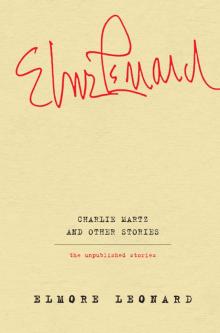 Charlie Martz and Other Stories: The Unpublished Stories
Charlie Martz and Other Stories: The Unpublished Stories Elmore Leonard's Western Roundup #2
Elmore Leonard's Western Roundup #2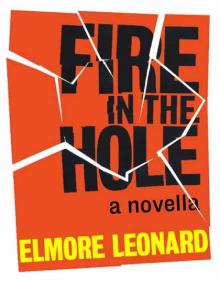 Fire in the Hole
Fire in the Hole Tishomingo Blues (2002)
Tishomingo Blues (2002)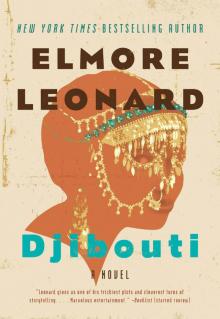 Djibouti
Djibouti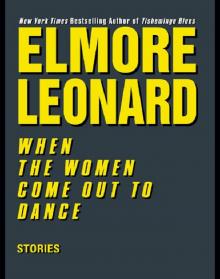 When the Women Come Out to Dance: Stories
When the Women Come Out to Dance: Stories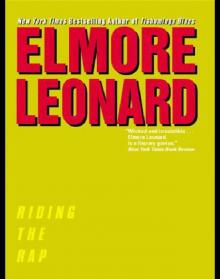 Riding the Rap
Riding the Rap Moment of Vengeance and Other Stories
Moment of Vengeance and Other Stories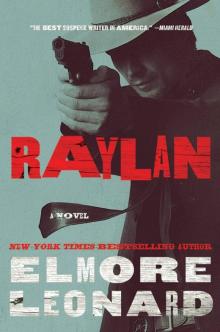 Raylan
Raylan Touch
Touch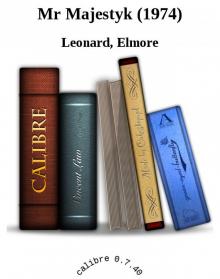 Mr Majestyk
Mr Majestyk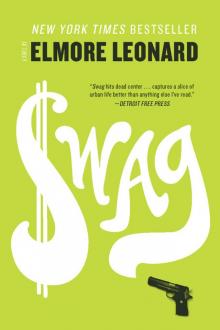 Swag
Swag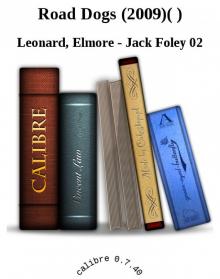 Road Dogs
Road Dogs La Brava
La Brava The Hot Kid
The Hot Kid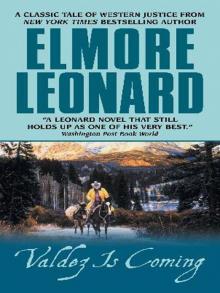 Valdez Is Coming: A Novel
Valdez Is Coming: A Novel Be Cool
Be Cool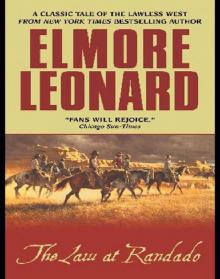 The Law at Randado
The Law at Randado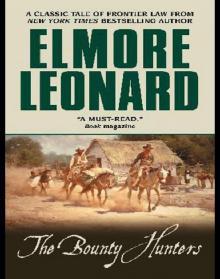 The Bounty Hunters
The Bounty Hunters When the Women Come Out to Dance
When the Women Come Out to Dance 310 to Yuma and Other Stories (1953)
310 to Yuma and Other Stories (1953)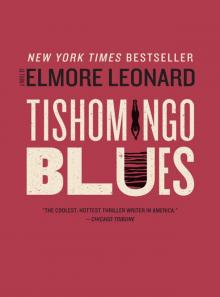 Tishomingo Blues
Tishomingo Blues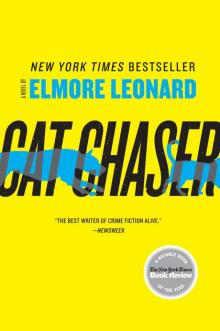 Cat Chaser
Cat Chaser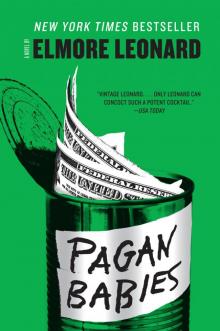 Pagan Babies
Pagan Babies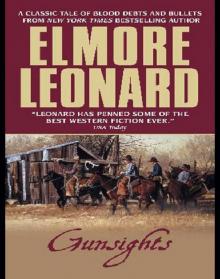 Elmore Leonard's Western Roundup #1
Elmore Leonard's Western Roundup #1 52 Pickup
52 Pickup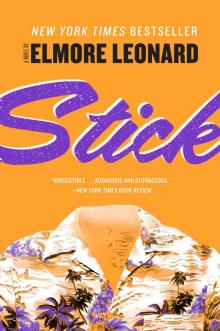 Stick
Stick The Moonshine War
The Moonshine War Valdez Is Coming
Valdez Is Coming City Primeval
City Primeval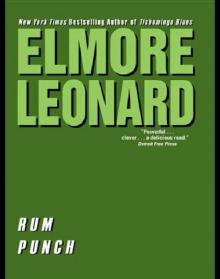 Rum Punch
Rum Punch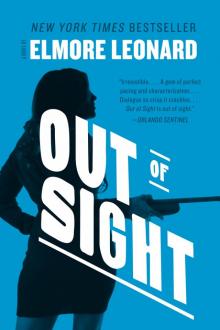 Out of Sight
Out of Sight Naked Came the Manatee (1996)
Naked Came the Manatee (1996)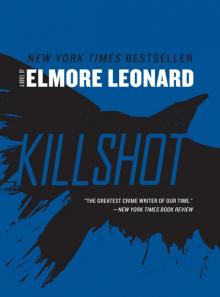 Killshot
Killshot Cuba Libre
Cuba Libre Forty Lashes Less One
Forty Lashes Less One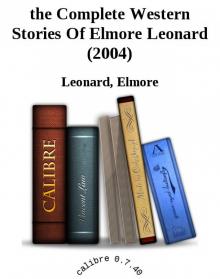 The Complete Western Stories of Elmore Leonard
The Complete Western Stories of Elmore Leonard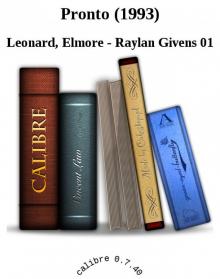 Pronto
Pronto Split Images
Split Images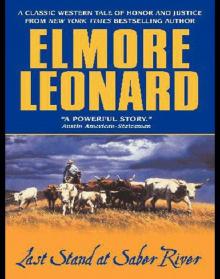 Last Stand at Saber River
Last Stand at Saber River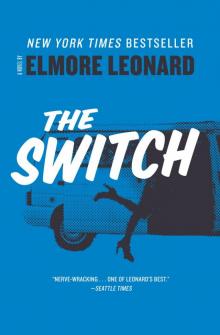 The Switch
The Switch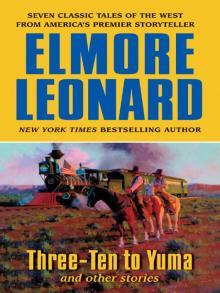 Three-Ten to Yuma and Other Stories
Three-Ten to Yuma and Other Stories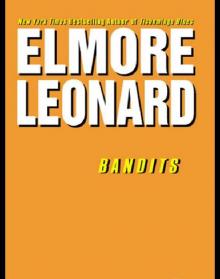 Bandits
Bandits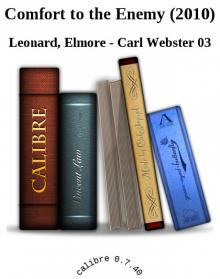 Comfort to the Enemy and Other Carl Webster Stories
Comfort to the Enemy and Other Carl Webster Stories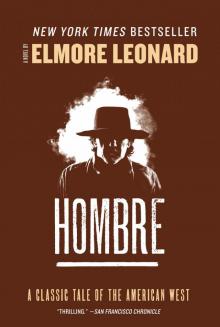 Hombre
Hombre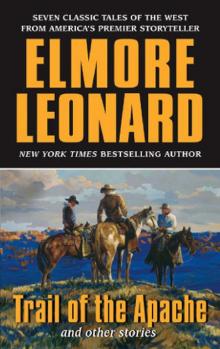 Trail of the Apache and Other Stories
Trail of the Apache and Other Stories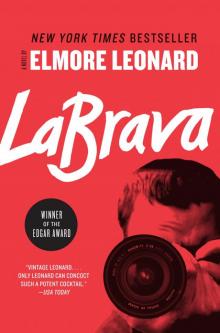 LaBrava
LaBrava Gold Coast
Gold Coast Jackie Brown
Jackie Brown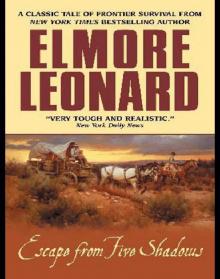 Escape From Five Shadows
Escape From Five Shadows Karen Makes out (1996)
Karen Makes out (1996)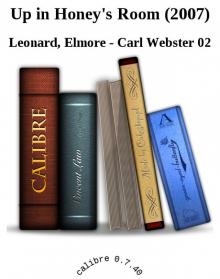 Up in Honey's Room
Up in Honey's Room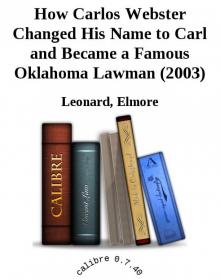 How Carlos Webster Changed His Name to Carl and Became a Famous Oklahoma Lawman (2003)
How Carlos Webster Changed His Name to Carl and Became a Famous Oklahoma Lawman (2003)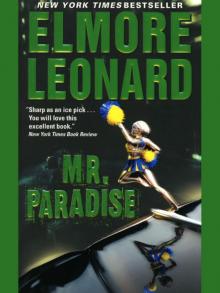 Mr. Paradise
Mr. Paradise The Hunted
The Hunted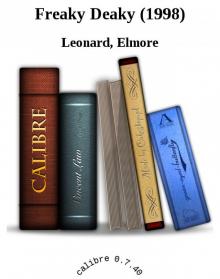 Freaky Deaky
Freaky Deaky Louly and Pretty Boy (Ss)
Louly and Pretty Boy (Ss)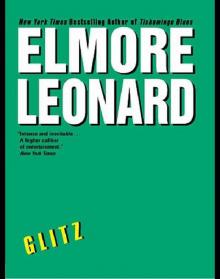 Glitz
Glitz A Coyote's in the House
A Coyote's in the House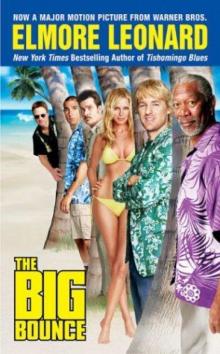 The Big Bounce jr-1
The Big Bounce jr-1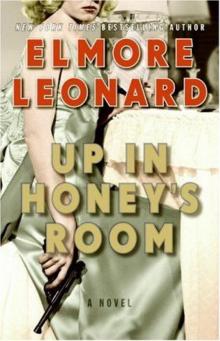 Up in Honey's Room cw-2
Up in Honey's Room cw-2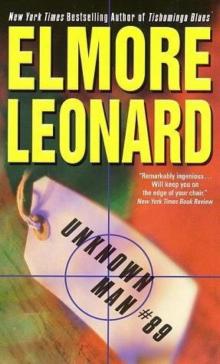 Unknown Man #89 jr-3
Unknown Man #89 jr-3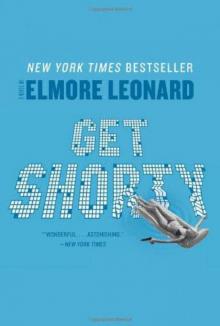 Get Shorty: A Novel cp-1
Get Shorty: A Novel cp-1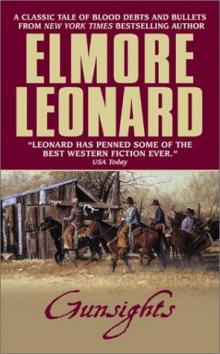 Gunsights
Gunsights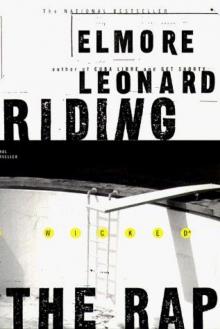 Riding the Rap rg-2
Riding the Rap rg-2